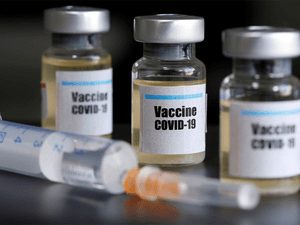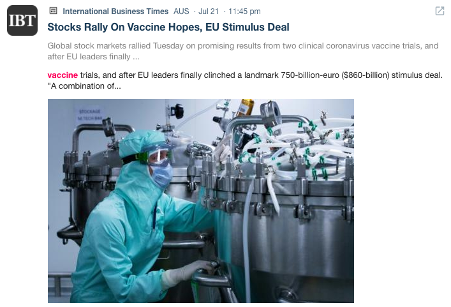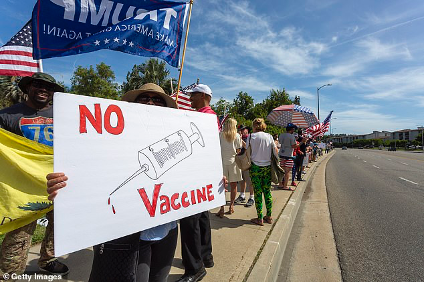
Optimists, rejoice! The future doesn’t look so bleak now that Novavax has announced the successful completion of their Phase 1 SARS-CoV-2 nanoparticle vaccine trial. Since the genome sequence of the coronavirus was released back in January, more than 160 vaccines are currently in development in a number of labs across the world. This includes the work of researchers at Monash University here in Victoria. Surely among these candidates, a viable protection against this virus can be found. Surely…
As the global research community comes together to celebrate this announcement, we take a look at what the media had to say.
A recent study available on medRxiv* revealed the vaccine developed by Novavax was found to be well tolerated. Demonstrating an immunogenic-inducing T-cell response. Which means, in layman’s terms, great news for everyone.
Using our media monitoring tool Meltwater we searched for the keyword “vaccine.” We did this to sense check the Australian media’s appetite for the topic since Novavax’s breakthrough announcement.
We took a look at the Media Exposure over the last 30 days. In the graph below we see interest grew on the subject of vaccines back in July.
Media interest in vaccines rose again when the initial announcement about a potential vaccine was released. Novavax made that announcement on the 4th of August. Although, the number of hits for this particular keyword has decreased since then.


This steady decrease is surprising to see. Especially since we know a lot of Australians, in Victoria in particular, are anticipating a vaccine and hope for a pandemic-free world.
Finding a vaccine is hard enough, apparently persuading populations to access it could also be challenging. Anger is growing in some quarters over the essential restrictions. Restrictions that are crucial in slowing the spread of the disease.
A group calling themselves “Virus Truth” has popped up in the Netherlands and is co-led by a former biochemist-turned-dance instructor, Willem Engel. Maybe he’s blaming it on the boogie?

If you’re thinking, it’s all just conspiracy theorists, anti-vaxxers and far-right or far-left activists leading the anti-vaccine movement then we’re sorry to say that’s not the case. Worryingly, the movement has continued to snowball.
Only 30% of Brits would definitely get a coronavirus vaccine if it were made available. That’s according to new research by pollsters Ipsos Mori and Kings College London university. The survey also revealed that 16% were either unlikely to get a vaccine or definitely wouldn’t. 36% of respondents who said they definitely wouldn’t get a vaccine believed “too much fuss” is being made of the virus.
Our friends in the US also have a thing or two to say about a coronavirus vaccine. A new survey conducted by Gallup revealed one-third of Americans say they would refuse to be vaccinated. The Gallup poll asked 7,632 respondents the following question: “If an FDA-approved vaccine to prevent coronavirus/COVID-19 was available right now at no cost, would you agree to be vaccinated?”

Bringing the conversation closer to home, we have created a word cloud based on the media hits over the last seven days in Australia that contain the term “anti-vaxxer”. The results are pretty interesting.

We see a diverse range of weighty terms thrown in the mix. Terms such as “freedom”, “democracy” and “equal rights amendment” appear alongside “ignorance”, “misinformation” and “naive”. It is unfortunate to see “America” in the word cloud because anti-vaccine promotion is not just an American problem.
Australian-run Facebook page 99% Unite helped promote anti-lockdown protests in Melbourne. Coincidentally it also dabbles in the promotion of anti-vaccination material. Australian media cited the group as one of the Facebook groups behind the spread of “Plandemic” misinformation. The social networking site has since removed them for promoting fake news.

It looks like the public health experts and political leaders who say a vaccine is our only hope of stopping the spread of the coronavirus have some work to do. But it’s not all doom and gloom.
Developing a vaccination typically takes five to seven years but experts estimate that, thanks to previous research on different strands of coronavirus and the number of people working together, it’s possible that a year to 18 months could be a realistic timeline. Individual companies and research labs expect that they might be able to deliver a vaccine even sooner.
Many people share the desire that an effective coronavirus vaccine may be our ticket back to the old normal, or at least something close to it. In the meantime, we will hold out hope.
Sign up to our weekly analyses and healthcare industry articles by getting in touch at: [email protected]
Reference
MedRxiv publishes preliminary scientific reports that are not peer-reviewed.